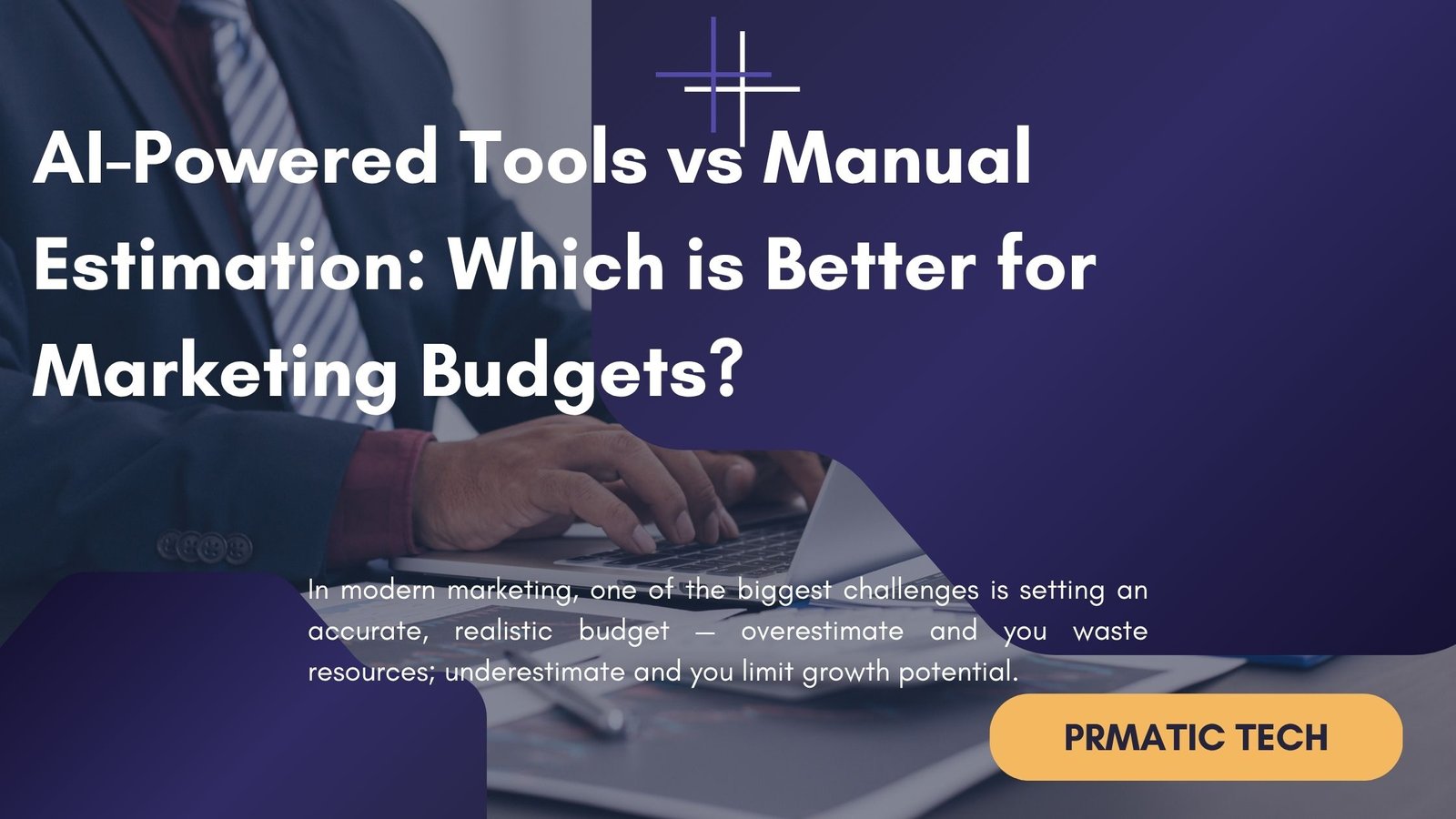In the competitive world of digital marketing, budget accuracy can make or break your campaigns. Spend too much, and you risk overshooting your ROI targets. Spend too little, and your campaigns might fail to generate meaningful impact.
With rapid advancements in artificial intelligence (AI), many marketers are now relying on AI-powered cost estimation tools to calculate and optimize their marketing budgets. Meanwhile, traditional marketers still prefer manual estimation methods that rely on experience, intuition, and human analysis.
So, which one truly delivers better results for your business? Let’s explore both methods in detail and discover how Promatic Tech’s Digital Marketing Cost Estimator can help you find the perfect balance.
Understanding the Two Approaches
Manual Estimation: The Traditional Method
Manual estimation involves calculating marketing budgets based on human analysis, experience, and historical data. Marketing teams or agencies typically review past campaign performance, market trends, and expected outcomes to estimate costs for future campaigns.
How It Works
- Reviewing historical marketing data
- Comparing industry benchmarks and competitor spending
- Considering campaign goals and duration
- Using spreadsheets or calculators for calculations
- Factoring in human intuition and market experience
Advantages of Manual Estimation
✅ Transparency: Every assumption and calculation is visible.
✅ Flexibility: You can adapt quickly to specific business needs or unique goals.
✅ Experience-based judgment: Perfect for small businesses or niche industries where market data is limited.
Drawbacks of Manual Estimation
❌ Time-consuming: Requires extensive data collection and analysis.
❌ Prone to bias: Human intuition can lead to overestimation or underestimation.
❌ Inconsistent: Different people may arrive at different conclusions using the same data.
AI-Powered Estimation: The Modern Approach
AI-powered tools are revolutionizing how marketing budgets are created. These systems use algorithms, machine learning, and predictive analytics to provide real-time, data-driven cost estimates for various digital marketing services.
Promatic Tech’s Digital Marketing Cost Estimator is an excellent example of this. It analyzes various inputs — such as your business goals, competition level, and campaign type — to generate accurate cost predictions in seconds.
How AI Estimators Work
- Collects input parameters (industry, location, campaign type, duration)
- Analyzes real-time market trends and benchmarks
- Applies machine learning models to predict likely costs
- Generates an estimated budget or range for each campaign type
Advantages of AI-Powered Estimation
✅ Speed: Get instant results without manual calculations.
✅ Data-driven accuracy: Based on thousands of data points and industry metrics.
✅ Scalability: Can analyze multiple campaigns or markets simultaneously.
✅ Consistency: Delivers repeatable, unbiased results.
✅ Predictive insights: Suggests ideal budget ranges based on market performance.
Drawbacks of AI Estimators
❌ Limited context: AI cannot always interpret emotional or creative factors.
❌ Data dependency: Accuracy depends on the quality of the data provided.
❌ Less control: Users might not fully understand the logic behind the AI’s output.
Head-to-Head Comparison: AI Tools vs Manual Estimation
| Factor | Manual Estimation | AI-Powered Tools |
| Speed | Slower; requires manual effort | Instant estimates in seconds |
| Accuracy | Depends on experience | Driven by data and algorithms |
| Transparency | Fully visible assumptions | May use complex models (less transparent) |
| Flexibility | Easy to adjust for special cases | Works best with standard campaign inputs |
| Bias Risk | High (human error or judgment bias) | Minimal (data-based logic) |
| Scalability | Limited | Highly scalable for multiple projects |
| Adaptability | Manual updates needed | Real-time updates based on trends |
| Cost Efficiency | Requires team time and effort | Saves labor and time costs |
From this comparison, it’s clear that AI-powered estimation tools offer superior efficiency and scalability, while manual estimation remains valuable for custom or highly specialized campaigns.
Case Study: Promatic Tech’s Digital Marketing Cost Estimator
One of the best examples of AI in marketing budget planning is Promatic Tech’s Digital Marketing Cost Estimator — a free, AI-powered tool that helps marketers and business owners predict campaign costs across various digital channels.
What It Does
The tool provides instant estimates for multiple services, including:
- SEO (Search Engine Optimization)
- PPC (Pay-Per-Click) Advertising
- Web Development
- Content Marketing
- Guest Posting
- Technical SEO and more
With just a few inputs like campaign type, target region, and business goals, you receive an accurate cost projection to help plan your digital marketing budget.
Why Businesses Love It
✅ Saves hours of manual budgeting
✅ Provides a realistic cost range for planning
✅ Helps compare different marketing strategies
✅ Perfect for startups, agencies, and enterprises
This tool acts as your first step in smart budget planning, helping you estimate marketing costs before hiring agencies or allocating funds.
When to Use AI-Powered Tools vs Manual Estimation
Use AI-Powered Tools When:
- You need quick, data-driven results.
- You are planning multiple campaigns across different channels.
- You want to compare costs between SEO, PPC, and content marketing.
- You lack historical marketing data.
Use Manual Estimation When:
- Your business operates in a very specific niche market.
- You have years of reliable campaign performance data.
- You need to incorporate creative or brand-specific factors.
- You prefer hands-on control of the budgeting process.
The Ideal Solution: A Hybrid Approach
The smartest strategy isn’t to choose one over the other — it’s to combine both methods for maximum precision.
- Start with AI-powered estimators like Promatic Tech’s tool to create a baseline budget.
- Review and refine manually using your company’s internal data and experience.
- Adjust for market conditions or unexpected costs.
- Validate results by comparing estimates to real campaign outcomes.
This hybrid approach offers both speed and strategic depth, giving you reliable numbers backed by human judgment.
Real-World Example
Let’s say you want to run a PPC campaign for your eCommerce business.
- You enter your details into the Digital Marketing Cost Estimator.
- It suggests an estimated cost range of $2,000 – $3,000/month based on competition and market trends.
- You then manually review your previous CPC (Cost-Per-Click) data and conversion rates.
- Based on your manual analysis, you adjust the final budget to $2,500/month, including a 10% buffer.
This workflow saves time, increases accuracy, and ensures your marketing spend is both data-driven and strategically validated.
Why Smart Businesses Are Shifting to AI Estimators
Modern businesses value data accuracy, efficiency, and adaptability. AI tools like those from Promatic Tech make budget estimation easier, faster, and more reliable — allowing teams to focus on strategy instead of spreadsheets.
They not only streamline financial planning but also:
- Improve cost forecasting accuracy
- Help reduce budget wastage
- Allow better ROI measurement
- Empower small businesses with free access to professional-grade insights
Final Thoughts
Both AI-powered estimators and manual estimation methods have their place in modern marketing. However, as digital marketing evolves, AI tools are rapidly becoming indispensable for businesses that demand speed, precision, and scalability.
By using Promatic Tech’s Digital Marketing Cost Estimator, you can get instant, data-driven insights into your marketing budget — helping you plan smarter and execute more effectively.
The best approach? Use AI tools for accuracy and manual input for expertise.
Together, they create a winning formula for smarter marketing investments and maximum ROI.





Great information!